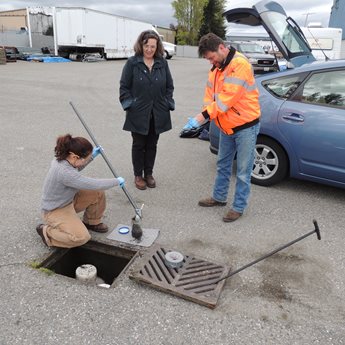Best practices for businesses
Many people think that most water pollution comes from big industries. However, over the years we've worked with large businesses and had great success in controlling the pollution they produce.
Today, smaller businesses also need to do their part to properly manage hazardous substances to keep water clean.
One of the most common types of pollution from businesses is contaminated water runoff, usually from cleaning and maintenance activities. Many common products used in businesses contain toxic chemicals. Even products you might think of as safe — such as soaps, detergents, and other cleaners (even those sold as ‘biodegradable’) — can be harmful if they escape into Washington’s waterways.
Water runoff picks up harmful substances from parking lots, roofs, streets, and sidewalks. These pollutants flow directly into creeks, rivers, and lakes without any treatment. They can contaminate drinking water, foul waterways and beaches, close shellfish beds, kill fish and other animals.
Simple best management practices (BMPs) can prevent stormwater pollution, and prevention is good business. It helps keep water and beaches clean, and shows customers you care about your community.
Your business can do its part to minimize contributions to stormwater pollution by applying the following common sense practices.
Find your street drain and keep it pollution free
Your drain should be easy to spot next to the curb on the street running by or near your business. Or just watch where the water goes next time it rains or the snow melts.
Manage your hazardous products and wastes to keep them out of the storm drain:
- Cover: Store hazardous products and wastes in sturdy, leak-proof containers with tight-fitting lids.
- Label: Label clearly what is in every container. Do not mix different chemicals in the same container.
- Contain: If containers are kept outside, place them under cover and keep them off the ground (example: set on a pallet).
- Repair: As you do your daily cleanup, look for drips and leaks; immediately repair faulty connectors, hoses, valves, etc.
- Clean: Dry sweep your parking lot and outside storage areas weekly.
- Prepare: Have and use a spill kit. What is in your spill kit usually depends on what kind of chemicals you have and the nature and size of your operation. Typically, spill kit items help contain and soak up spills quickly. Many spill kit supplies can be purchased from general stores. Others can be purchased from industrial supply vendors.
Sample list of spill-kit supplies:
- Sorbent booms
- Kitty litter
- Sorbent pads
- Plastic sheeting (for drain cover)
- Garbage bags and zip ties
- Acid/base neutralizer
- Safety gloves and goggles
Good business practices for your mobile business
A mobile business is any business that does not operate from a fixed location. Mobile businesses are essential to communities and like other businesses have the potential to pollute stormwater through their everyday business activities. How and where you dispose of the waste and wastewater from these activities matters.
Wastewater from carpet cleaning or pressure washing may contain dirt, soap, oil, grease, solvents, and other toxic chemicals. These common pollutants, if not properly managed, can enter waterways and harm the animals and plants that live there.
Mobile businesses have a role in keeping lakes, rivers, marine and ground waters clean. Human health and the economy depend on it. Knowing your role can help protect Washington waters, save you money in fines, and also prevent negative publicity about your business.
It’s good business practice to show your customers that you care about your local community and the environment.
Smart carpet cleaning practices
Learn good business practices that are recommended for carpet cleaning and wastewater disposal in our Carpet Cleaning focus sheet.
Contact information
Justine Asohmbom
Shorelines and Stormwater Education Manager
justine.asohmbom@ecy.wa.gov
206-594-0009


